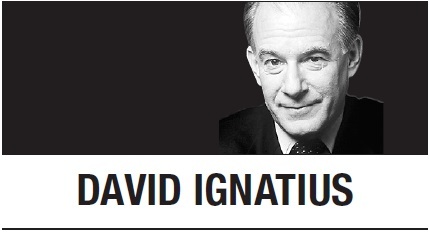[David Ignatius] Trump administration’s Iran sanctions could backfire
By David IgnatiusPublished : April 11, 2019 - 17:32
 The Trump administration’s “maximum pressure campaign” against Iran assumes that economic sanctions are weakening the Iranian Revolutionary Guard Corps -- and that more sanctions will make the IRGC weaker still. The problem is that US and European intelligence analysts don’t think this forecast is accurate.
The Trump administration’s “maximum pressure campaign” against Iran assumes that economic sanctions are weakening the Iranian Revolutionary Guard Corps -- and that more sanctions will make the IRGC weaker still. The problem is that US and European intelligence analysts don’t think this forecast is accurate. “Re-imposition of sanctions in 2018 has played into the hands of the IRGC,” warns one recent Western intelligence assessment. Rather than turning Iranians against the corrupt IRGC leadership, in other words, the US economic squeeze is instead giving Maj. Gen. Qassem Soleimani and his allies greater control over the Iranian economy.
The Iran sanctions paradox deepened this week with Secretary of State Mike Pompeo’s announcement that the US will designate the IRGC as a foreign terrorist organization. But as Pompeo warned Monday, the IRGC’s leaders are masters of “nationwide con artistry and corruption ... which they perpetrate against the regime’s own people.”
History has shown that these operatives find illegal ways to escape pressure, and that the economic vise instead tightens for the Iranian people.
Like so many Trump administration foreign-policy gambits, the Iran squeeze looks like a tactical campaign that’s in search of a strategy. Does the administration want negotiations? If so, why has it effectively banned the US from contact with Tehran’s power brokers? “We’ll preclude ourselves from talking to the people who matter,” warns Karim Sadjadpour, a senior fellow at the Carnegie Endowment for International Peace.
Does the administration instead seek a change of Iranian policy and less power for the hard-liners? If so, the US should be working to deepen fissures within the Iranian elite, rather than pushing different factions toward the IRGC. “The goal should be to widen political divisions,” argues Sadjadpour. “When you’re trying to foment political change, you need pressure from below and divisions above.”
Sanctions have their uses, to be sure. The ban on oil and financial transactions that President Donald Trump reimposed after withdrawing from the 2015 Iran nuclear deal has hit Iran hard. Oil exports have been cut in half, from 2.5 million barrels a day in April 2018 to about 1.25 million barrels in February 2019, according to Reuters. The International Monetary Fund predicted Tuesday that Iran’s economy will shrink 6 percent this year, after a 3.9 percent decline last year. Inflation is currently running at 47.5 percent.
The resulting cash squeeze means there’s less money for Iran to distribute to its proxies in Lebanon, Syria and Yemen.
Hassan Nasrallah, the leader of Hezbollah in Lebanon, said last month that the militia would need to do more internal fundraising. An Israeli official told me recently that as part of its belt-tightening, Hezbollah has cut some salaries by 40 percent. In Syria, too, the Iranians are reducing their support for Shiite militias, the Israeli official said.
The pressure is mounting, but to what end? As with other Trump administration foreign policies, it’s hard to discern the strategic goal. Trump has privately told foreign leaders that he wants to pressure Tehran back to the bargaining table and win a better, broader nuclear deal than the one negotiated by his predecessor, Barack Obama. But John Bolton, Trump’s national security adviser, has signaled instead that he wants to create conditions for regime change, rather than just renewed negotiation.
Imagine the White House confusion if Iran’s Ayatollah Ali Khamenei sent Trump a letter proposing a new round of nuclear and regional negotiations -- with Soleimani, the leader of the IRGC’s Quds Force, as his chief negotiator. Trump could claim a win, but such talks would violate the just-imposed terrorist designation.
The biggest danger of the escalating Iran campaign is that it risks unraveling the hard-won US success in Iraq over the past five years. About 5,000 US soldiers are now in Iraq, training the Iraqi military and checking the power of Iranian-backed Shiite militias. They could become targets, if Iran follows through on its tit-for-tat designation this week of Centcom forces as “terrorists.”
But even if Iran refrains from shooting at US troops, Tehran-backed politicians may pass legislation in the Iraqi parliament that would forbid continued US military training of Iraqi forces. That would be a real loss. Iran would pull Iraq deeper into its sphere of influence -- offsetting any US gains in Lebanon, Syria or Yemen.
Sanctions are like catnip for US policymakers. If you want to see how badly they can misfire, recall the US-led campaign of sanctions against the Iraqi regime of Saddam Hussein in the 1990s. That squeeze had the perverse effect of empowering Saddam’s clique of smugglers and torturers. We’re in danger of repeating that sorry chapter with Iran.
David Ignatius
Follow David Ignatius on Twitter: @IgnatiusPost -- Ed.
(Washington Post Writers Group)







![[Graphic News] More Koreans say they plan long-distance trips this year](http://res.heraldm.com/phpwas/restmb_idxmake.php?idx=644&simg=/content/image/2024/04/17/20240417050828_0.gif&u=)
![[KH Explains] Hyundai's full hybrid edge to pay off amid slow transition to pure EVs](http://res.heraldm.com/phpwas/restmb_idxmake.php?idx=644&simg=/content/image/2024/04/18/20240418050645_0.jpg&u=20240419100350)





![[From the Scene] Monks, Buddhists hail return of remains of Buddhas](http://res.heraldm.com/phpwas/restmb_idxmake.php?idx=652&simg=/content/image/2024/04/19/20240419050617_0.jpg&u=20240419175937)

![[KH Explains] Hyundai's full hybrid edge to pay off amid slow transition to pure EVs](http://res.heraldm.com/phpwas/restmb_idxmake.php?idx=652&simg=/content/image/2024/04/18/20240418050645_0.jpg&u=20240419100350)

![[Today’s K-pop] Illit drops debut single remix](http://res.heraldm.com/phpwas/restmb_idxmake.php?idx=642&simg=/content/image/2024/04/19/20240419050612_0.jpg&u=)